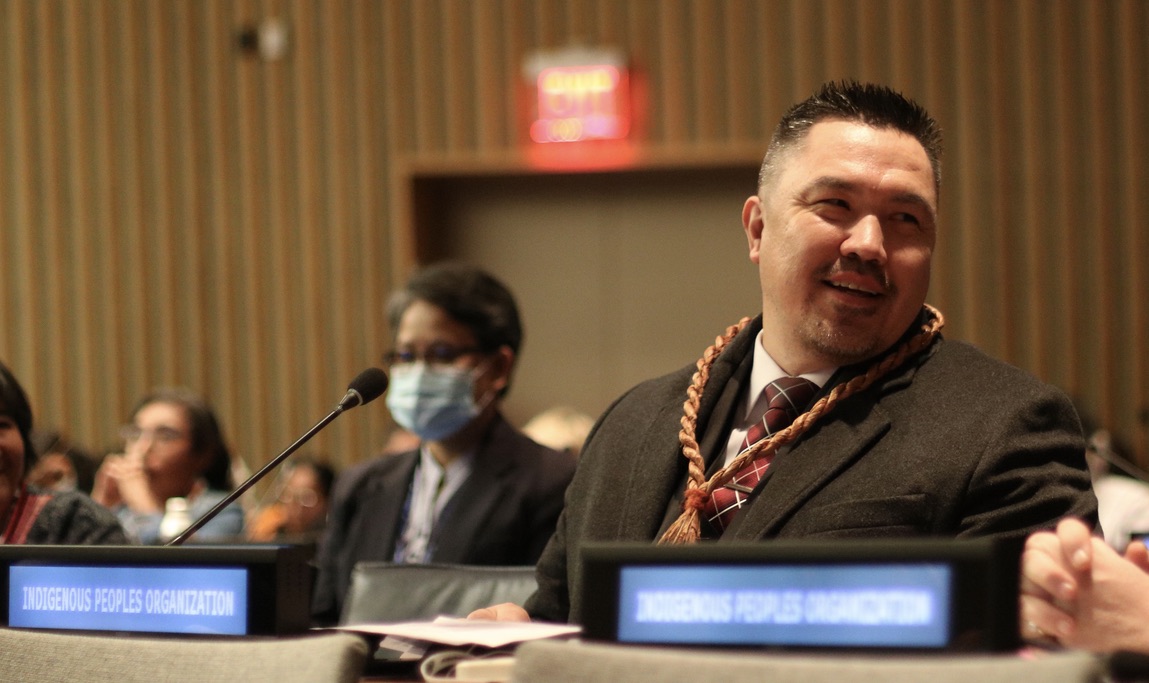
- Details
- By Jenna Kunze
NEW YORK—After a two-week forum at the United Nations headquarters in New York City, the UN’s United Nations Permanent Forum on Indigenous Issues adopted its final report on Friday, May 6. The meeting was convened nearly two hours late due to conflict over which languages would be included in the report.
Truth, Reconciliation, and Justice
A major highlight of the report was the Forum’s decision to create a working group dedicated to truth, reconciliation, and transitional justice, including in post-conflict areas, for lasting peace that respects the rights of Indigenous Peoples and promotes their full and effective inclusion, including Indigenous women.
The group was requested by Shawnee Chief Ben Barnes and Assembly of First Nations National Chief RoseAnne Archibald. Its core will be the three Indigenous members of the United Nations Expert Mechanism on the Rights of Indigenous Peoples: Sheryl Lightfoot (Anishinaabe First Nations), Laila Susanne Vars (Norwegian-Sámi), and Megan Davis (Aboriginal Australian). It will also include other Indigenous people, academics, and representatives of civil-society groups.
Social Determinants of Indigenous Peoples health
The Permanent Forum’s report also recommends that the World Health Organization incorporate indigenous people’ culture into its policies on the social determinants of health, and that WHO review, update, and expand its policies on Indigenous peoples’ health.
Youth delegate Anpo Jensen (Oglala Lakota) and National Indian Health Board Vice President Nickolaus Lewis both requested that the Permanent Forum included those as action items.
Lewis encouraged the UN to make public health issues of the world's indigenous peoples “a top and urgent priority.”
In response to Jensen’s testimony connecting mining in the Black Hills in South Dakota to disproportionately high suicide rates among Oglala Lakota youth on the nearby Pine Ridge Indian Reservation, the Forum called upon the UN’s Food and Agriculture Organization and WHO to amend their codes of conduct on pesticide management to include free, prior, and informed consent for Indigenous peoples.
The Permanent Forum also called on Canada and the United States of America to develop national action plans “to realize the aims of the UNDRIP [United Nations Declaration on the Rights of Indigenous Peoples] and appoint an Ambassador or Special Envoy on Global Indigenous Affairs to promote the rights of Indigenous Peoples globally, including on participation.”
The Permanent Forum on Indigenous Issues’ 22nd session will be held next year. Its theme will be a rights-based approach to Indigenous peoples, human health, planetary and territorial health, and climate change.
“It’s always a holistic theme,” Permanent Forum rapporteur Tove Søvndahl Gant (Denmark) told Native News Online.
More Stories Like This
Native News Weekly (August 25, 2024): D.C. BriefsNative News Weekly (February 22, 2026): D.C. Briefs
NCAI Releases Sttatement on the Passing of Rev. Jesse Jackson
Colusa Indian Energy Participates in Port of Quincy Town Hall on Columbia Basin Power Project
Q&A: Jingle Dress Dancer Answered Call to Ceremony in Face of ICE Violence
Help us defend tribal sovereignty.
At Native News Online, our mission is rooted in telling the stories that strengthen sovereignty and uplift Indigenous voices — not just at year’s end, but every single day.
Because of your generosity last year, we were able to keep our reporters on the ground in tribal communities, at national gatherings and in the halls of Congress — covering the issues that matter most to Indian Country: sovereignty, culture, education, health and economic opportunity.
That support sustained us through a tough year in 2025. Now, as we look to the year ahead, we need your help right now to ensure warrior journalism remains strong — reporting that defends tribal sovereignty, amplifies Native truth, and holds power accountable.
 The stakes couldn't be higher. Your support keeps Native voices heard, Native stories told and Native sovereignty defended.
The stakes couldn't be higher. Your support keeps Native voices heard, Native stories told and Native sovereignty defended.
Stand with Warrior Journalism today.
Levi Rickert (Potawatomi), Editor & Publisher

